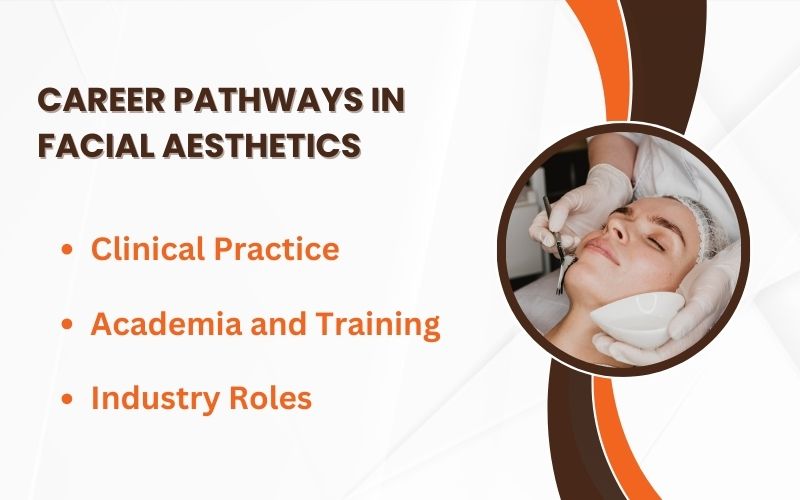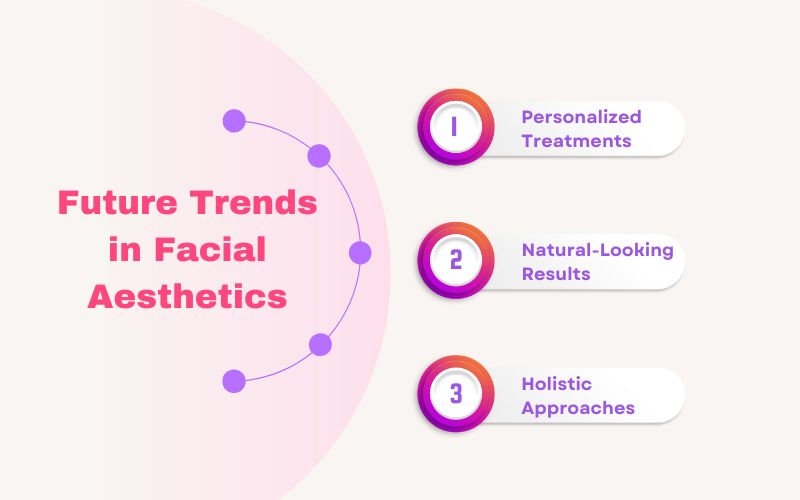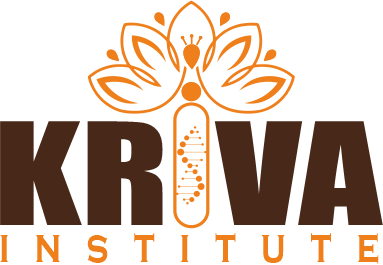Scope of a Career in Facial Aesthetics
The field of facial aesthetics is rapidly evolving, offering numerous opportunities for those interested in enhancing beauty and confidence through non-surgical procedures. Kriva Institute in Ahmedabad is at the forefront of this dynamic field, providing advanced education and training for aspiring professionals. This guide explores the Scope of a Career in Facial Aesthetics, highlighting the potential, opportunities, and necessary qualifications to thrive in this industry.
What is Facial Aesthetics?
Facial aesthetics refers to a range of non-surgical treatments designed to improve the appearance of the face. These treatments include dermal fillers, Botox injections, chemical peels, and laser therapies, among others. The goal is to enhance facial features, reduce signs of aging, and boost overall facial harmony.
Why Pursue a Career in Facial Aesthetics?
The demand for facial aesthetic procedures has surged in recent years, driven by an increasing desire for youthful and rejuvenated appearances. According to a report by the American Society of Plastic Surgeons, non-surgical cosmetic procedures have seen a significant rise, with millions of procedures performed annually. This trend indicates a growing market and highlights the scope of a career in facial aesthetics as a promising path for trained professionals.
1. High Demand and Growth Potential :
- The global facial aesthetics market is projected to reach $19.4 billion by 2027, growing at a compound annual growth rate (CAGR) of 11.2% from 2020 to 2027.
- With more people seeking minimally invasive treatments, the need for skilled practitioners is higher than ever.
2. Lucrative Career Opportunities :
- Professionals in this field can expect competitive salaries. For instance, aesthetic nurses in the US earn an average of $85,621 annually, while experienced practitioners can earn significantly more.
- Opportunities extend beyond clinical practice to roles in education, research, and product development.
3. Flexibility and Work-Life Balance :
- Many aesthetic practitioners enjoy flexible working hours, allowing for a better work-life balance compared to other medical professions.
Essential Qualifications and Skills
To embark on a career in facial aesthetics, certain qualifications and skills are essential:
1. Medical Background :
- A medical degree (MD, DO, or equivalent) is typically required to perform aesthetic procedures.
- Additional certifications in cosmetic dermatology or plastic surgery can enhance credibility and expertise.
2. Specialized Training :
- Institutions like Kriva Institute offer specialized courses in facial aesthetics, covering theoretical knowledge and hands-on training.
- Continuing education is crucial to stay updated with the latest techniques and technologies.
3. Soft Skills :
- Excellent communication skills to understand patient needs and explain procedures.
- An artistic eye and attention to detail to achieve natural-looking results.
Career Pathways in Facial Aesthetics

A career in facial aesthetics offers diverse pathways, each with unique opportunities and challenges:
1. Clinical Practice :
- Working in clinics, hospitals, or private practices, performing a range of aesthetic procedures.
- Building a loyal patient base through excellent results and personalized care.
2. Academia and Training :
- Teaching and training the next generation of aesthetic practitioners.
- Involvement in academic research to advance the field of facial aesthetics.
3. Industry Roles :
- Working with pharmaceutical companies, developing and marketing aesthetic products.
- Conducting clinical trials and research to improve treatment outcomes.
Challenges and Considerations
While a career in facial aesthetics is rewarding, it comes with challenges:
1. Regulatory and Ethical Issues :
- Practitioners must adhere to strict regulations and ethical guidelines to ensure patient safety and maintain professional integrity.
2. Market Competition :
- The popularity of facial aesthetics means increased competition. Continuous learning and skill enhancement are vital to staying competitive.
3. Patient Expectations :
- Managing patient expectations and delivering consistent results require a high level of expertise and professionalism.
The Role of Technology in Facial Aesthetics
Technology plays a crucial role in advancing facial aesthetics. Here are some ways technology is shaping the field:
1. Advanced Treatment Techniques :
- Innovations such as laser treatments, ultrasound therapy, and radiofrequency devices offer non-invasive solutions with minimal downtime and impressive results.
2. Digital Imaging and Simulation :
- Digital imaging tools allow practitioners to create simulations of potential outcomes, helping patients visualize results and make informed decisions.
3. Telemedicine :
- The rise of telemedicine enables practitioners to offer virtual consultations, expanding their reach and providing convenient care options for patients.
Continuing Education and Professional Development
Technology plays a crucial role in advancing facial aesthetics. Here are some ways technology is shaping the field:
1. Workshops and Conferences :
- Attending workshops and conferences provides opportunities to learn about the latest techniques, network with peers, and gain insights from industry experts.
2. Certification Programs :
- Enrolling in certification programs offered by reputable institutions like Kriva Institute ensures that practitioners stay updated with industry standards and best practices.
3. Online Courses and Webinars :
- Online courses and webinars offer flexible learning options for busy professionals, covering a wide range of topics from basic techniques to advanced procedures.
The Importance of Ethical Practice
Ethical practice is paramount in facial aesthetics. Here are some key ethical considerations:
1. Informed Consent :
- Practitioners must ensure that patients fully understand the procedures, risks, benefits, and alternatives before proceeding with any treatment.
2. Transparency :
- Attending workshops and conferences provides opportunities to learn about the latest techniques, network with peers, and gain insights from industry experts.
3. Patient-Centered Care :
- Prioritizing patient well-being and satisfaction over profit is essential for maintaining ethical standards and professional integrity.
Future Trends in Facial Aesthetics

The field of facial aesthetics is continually evolving. Here are some upcoming trends to consider:
1. Personalized Treatments :
- Advances in genetic research and biotechnology are paving the way for personalized treatments tailored to individual patients' unique needs and characteristics.
2. Natural-Looking Results :
- The trend towards subtle, natural-looking enhancements is expected to continue, with patients seeking results that enhance their features without appearing overdone.
3. Holistic Approaches :
- Integrating wellness and holistic approaches, such as nutrition and skincare, into facial aesthetics can offer comprehensive solutions for overall facial rejuvenation.
Conclusion
The scope of a career in facial aesthetics is vast and promising. With the right education and training, such as that provided by Kriva Institute in Ahmedabad, aspiring professionals can build successful and fulfilling careers. As the demand for aesthetic treatments continues to grow, so do the opportunities for those equipped with the knowledge and skills to excel in this field.
For more information on courses and training programs, visit Kriva Institute.
Frequently Asked Questions (FAQs)
To begin a career in facial aesthetics, you typically need a medical degree and specialized training in aesthetic procedures.
Facial aesthetic procedures, when performed by qualified professionals, are generally safe. It's important to choose qualified practitioners and reputable clinics.
Continuing education through workshops, conferences, and advanced courses is essential to stay abreast of the latest techniques and technologies in facial aesthetics.

The field of facial aesthetics is rapidly evolving, offering numerous opportunities for those interested in enhancing beauty and confidence through non-surgical procedures. Kriva Institute in Ahmedabad is at the forefront of this dynamic field, providing advanced education and training for aspiring professionals. This guide explores the Scope of a Career in Facial Aesthetics, highlighting the potential, opportunities, and necessary qualifications to thrive in this industry.
What is Facial Aesthetics?
Facial aesthetics refers to a range of non-surgical treatments designed to improve the appearance of the face. These treatments include dermal fillers, Botox injections, chemical peels, and laser therapies, among others. The goal is to enhance facial features, reduce signs of aging, and boost overall facial harmony.
Why Pursue a Career in Facial Aesthetics?
The demand for facial aesthetic procedures has surged in recent years, driven by an increasing desire for youthful and rejuvenated appearances. According to a report by the American Society of Plastic Surgeons, non-surgical cosmetic procedures have seen a significant rise, with millions of procedures performed annually. This trend indicates a growing market and highlights the scope of a career in facial aesthetics as a promising path for trained professionals.
1. High Demand and Growth Potential :
- The global facial aesthetics market is projected to reach $19.4 billion by 2027, growing at a compound annual growth rate (CAGR) of 11.2% from 2020 to 2027.
- With more people seeking minimally invasive treatments, the need for skilled practitioners is higher than ever.
2. Lucrative Career Opportunities :
- Professionals in this field can expect competitive salaries. For instance, aesthetic nurses in the US earn an average of $85,621 annually, while experienced practitioners can earn significantly more.
- Opportunities extend beyond clinical practice to roles in education, research, and product development.
3. Flexibility and Work-Life Balance :
- Many aesthetic practitioners enjoy flexible working hours, allowing for a better work-life balance compared to other medical professions.
Essential Qualifications and Skills
To embark on a career in facial aesthetics, certain qualifications and skills are essential:
1. Medical Background :
- A medical degree (MD, DO, or equivalent) is typically required to perform aesthetic procedures.
- Additional certifications in cosmetic dermatology or plastic surgery can enhance credibility and expertise.
2. Specialized Training :
- Institutions like Kriva Institute offer specialized courses in facial aesthetics, covering theoretical knowledge and hands-on training.
- Continuing education is crucial to stay updated with the latest techniques and technologies.
3. Soft Skills :
- Excellent communication skills to understand patient needs and explain procedures.
- An artistic eye and attention to detail to achieve natural-looking results.
Career Pathways in Facial Aesthetics

A career in facial aesthetics offers diverse pathways, each with unique opportunities and challenges:
1. Clinical Practice :
- Working in clinics, hospitals, or private practices, performing a range of aesthetic procedures.
- Building a loyal patient base through excellent results and personalized care.
2. Academia and Training :
- Teaching and training the next generation of aesthetic practitioners.
- Involvement in academic research to advance the field of facial aesthetics.
3. Industry Roles :
- Working with pharmaceutical companies, developing and marketing aesthetic products.
- Conducting clinical trials and research to improve treatment outcomes.
Challenges and Considerations
While a career in facial aesthetics is rewarding, it comes with challenges:
1. Regulatory and Ethical Issues :
- Practitioners must adhere to strict regulations and ethical guidelines to ensure patient safety and maintain professional integrity.
2. Market Competition :
- The popularity of facial aesthetics means increased competition. Continuous learning and skill enhancement are vital to staying competitive.
3. Patient Expectations :
- Managing patient expectations and delivering consistent results require a high level of expertise and professionalism.
The Role of Technology in Facial Aesthetics
Technology plays a crucial role in advancing facial aesthetics. Here are some ways technology is shaping the field:
1. Advanced Treatment Techniques :
- Innovations such as laser treatments, ultrasound therapy, and radiofrequency devices offer non-invasive solutions with minimal downtime and impressive results.
2. Digital Imaging and Simulation :
- Digital imaging tools allow practitioners to create simulations of potential outcomes, helping patients visualize results and make informed decisions.
3. Telemedicine :
- The rise of telemedicine enables practitioners to offer virtual consultations, expanding their reach and providing convenient care options for patients.
Continuing Education and Professional Development
Technology plays a crucial role in advancing facial aesthetics. Here are some ways technology is shaping the field:
1. Workshops and Conferences :
- Attending workshops and conferences provides opportunities to learn about the latest techniques, network with peers, and gain insights from industry experts.
2. Certification Programs :
- Enrolling in certification programs offered by reputable institutions like Kriva Institute ensures that practitioners stay updated with industry standards and best practices.
3. Online Courses and Webinars :
- Online courses and webinars offer flexible learning options for busy professionals, covering a wide range of topics from basic techniques to advanced procedures.
The Importance of Ethical Practice
Ethical practice is paramount in facial aesthetics. Here are some key ethical considerations:
1. Informed Consent :
- Practitioners must ensure that patients fully understand the procedures, risks, benefits, and alternatives before proceeding with any treatment.
2. Transparency :
- Attending workshops and conferences provides opportunities to learn about the latest techniques, network with peers, and gain insights from industry experts.
3. Patient-Centered Care :
- Prioritizing patient well-being and satisfaction over profit is essential for maintaining ethical standards and professional integrity.
Future Trends in Facial Aesthetics

The field of facial aesthetics is continually evolving. Here are some upcoming trends to consider:
1. Personalized Treatments :
- Advances in genetic research and biotechnology are paving the way for personalized treatments tailored to individual patients' unique needs and characteristics.
2. Natural-Looking Results :
- The trend towards subtle, natural-looking enhancements is expected to continue, with patients seeking results that enhance their features without appearing overdone.
3. Holistic Approaches :
- Integrating wellness and holistic approaches, such as nutrition and skincare, into facial aesthetics can offer comprehensive solutions for overall facial rejuvenation.
Conclusion
The scope of a career in facial aesthetics is vast and promising. With the right education and training, such as that provided by Kriva Institute in Ahmedabad, aspiring professionals can build successful and fulfilling careers. As the demand for aesthetic treatments continues to grow, so do the opportunities for those equipped with the knowledge and skills to excel in this field.
For more information on courses and training programs, visit Kriva Institute.
Frequently Asked Questions (FAQs)
To begin a career in facial aesthetics, you typically need a medical degree and specialized training in aesthetic procedures.
Facial aesthetic procedures, when performed by qualified professionals, are generally safe. It's important to choose qualified practitioners and reputable clinics.
Continuing education through workshops, conferences, and advanced courses is essential to stay abreast of the latest techniques and technologies in facial aesthetics.
